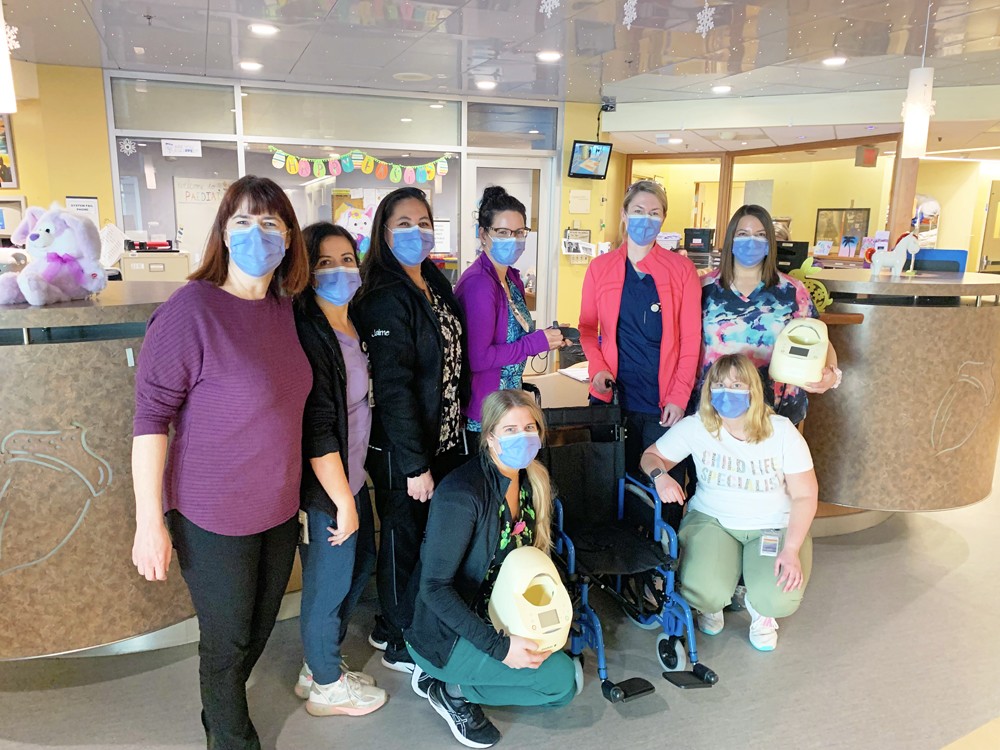Three Family Care Grants Make “Scary” Hospital Less Frightening for Our Youngest Patients
by Graham Strong
 Nurses in the 1B Paediatrics Unit including Amy Halvorsen (left) with the child-size wheelchair, two bottle warming units, and the infant vein finder (centre above wheelchair).
Nurses in the 1B Paediatrics Unit including Amy Halvorsen (left) with the child-size wheelchair, two bottle warming units, and the infant vein finder (centre above wheelchair).For children in the Paediatrics Unit (1B), our Hospital can be a scary place. But thanks to several Thunder Bay Regional Health Sciences Foundation Family Care Grants, the Hospital is a little less frightening. A new kid-sized wheelchair, two different vein finders, and new waterless bottle warmers will help improve comfort and safety for our smallest patients.
Amy Halvorsen, Manager of Paediatrics & Paediatric Outpatient at the Thunder Bay Regional Health Sciences Centre, is most excited about the vein finders. Not everyone has easy-to-find veins, and sometimes that leads to inserting the needle two or more times to find the vein. That can be especially traumatizing for young children and infants who don’t know what’s happening.
“I come from NICU, and we use them all the time,” Halvorsen said. “They’re really quite amazing.”
The Paediatric Unit now has two different vein finders: one for infants and one for small children. The infant model shines an LED light through the hand, illuminating exactly where the veins are. However, it only shines through very small hands. A second larger type – too large to use for infants – illuminates the veins from above. Both help finding the vein easier so it’s less painful.
“First poke is the best poke,” Halvorsen said. “We don’t want to have to try more than once on a baby or a child. Anything we can use to make that first attempt successful will make all the difference.”
The new wheelchair will help make transporting children around the Hospital more comfortable for the children – and more convenient for parents and staff.
“If they’re here for fractures and they need to go for X-rays or even if the parents want to take them outside in the summertime for some fresh air, it’s helpful to have a wheelchair that fits the patient,” Halvorsen said. Sometimes, children may have difficulty sitting up. Larger chairs make it even harder for them. “In a big chair, it’s hard to keep them steady and upright. That’s why it’s so important to have the proper size.”
The kid-size wheelchair also makes getting in and out of the chair safer. Plus, they have seatbelts and other safety features that adult chairs sometimes do not have.
Special waterless bottle warmers also increase safety for infants in 1B.
“Previously, we had to warm bottles in a sleeve of hot water,” Halvorsen said. “This made it harder to warm the milk to the ideal temperature every time. There’s a greater risk of the milk becoming too hot.”
This method also raises the risk of infection through contaminants in the water used for warming – and babies who are sick in 1B are already at higher risk of new infections. “You want to keep tap water separate from the milk so it’s sterile and clean.”
The new bottle warmers bring the milk to the ideal temperature without risk of water contamination or hotspots. Plus, it reduces much of the waste including the plastic sleeves used.
All three types of items were purchased thanks to your donations to the Family CARE Grant program. These are excellent examples of how smaller purchases can go a long way towards improving patient care. With your help, we can fund more projects like these! Please donate online at https://www.healthsciencesfoundation.ca/donate or call our Donation Centre at (807) 345-4673. Thank you!